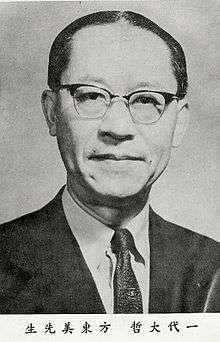Thomé H. Fang
| Thomé H. Fang | |
|---|---|
 Thomé H. Fang | |
| Born | February 9, 1899 |
| Died | July 13, 1977 (aged 78) |
| Occupation | Chinese philosopher |
Thomé H. Fang (Chinese: 方東美; pinyin: Fāng Dōngměi) was a Chinese philosopher.
From 1925 to 1948, Thomé H. Fang taught at several universities in China, mostly at the National Central University (later renamed Nanjing University and reinstated in Taiwan), in Nanking and Chungking. Then he taught at National Taiwan University.
Thomé H. Fang was the 16th generation descendant of Fang Bao, a Qing dynasty scholar and a relative of his contemporary Fang Chih, a Chinese diplomat.
Professor Charles A. Moore considered him the "greatest philosopher of China."[1]
Works
Thomé H. Fang was born on February 9, 1899(according to the Lunar Calendar) of a family in Tong Cheng, An-hui, China, that has produced scholars, thinkers, and men of letters in Chinese classics, including several Royal Tutors at the Imperial Palace during the Ming and Qing Dynasties (such as Fang Gongcheng, Fang Guanchen, etc.), (Thomé H. Fang—whose official name was Fang Xun. personal name: Dong-mei, meaning thereby “Eastern Beauty”—is the sixteenth generation descendant of Fang Bao (1668-1749), founder of the famous Tong Cheng Movement in the history of Chinese literature.
- Chinese Philosophy: Its Spirit and Its Development, Linking Publishing Co., Ltd, Taipei, 1981, 1986
- The Chinese View of Life: The Philosophy of Comprehensive Harmony, Linking Publishing Co., Ltd., Taipei, 1980, 1981, 1986
- Creativity in Man and Nature: A Collection of Philosophical Essays, Linking Publishing Co., Ltd., Taipei, 1980, 1983
- Chinese Philosophy:Its Spirit and Its Development, Linking Publishing Co., Ltd., Taipei, 1981, 1981, 1986
- Philosophy of Life, Creativity, and Inclusiveness,
- Three Types of Philosophical Wisdom (Zhexue san hui-哲學三慧),重慶版時事新報學燈,26 June 1983.
- Primordial Confucianism and Taoism (Yuan Shi Ru Jia Dao Jia Zhe Xue-原時儒家道家哲學), Taipei, 1983.
- Chinese Mahayana Buddhism (Chung Guo Da Zheng Fo Xue-中國大乘佛學),Taipei,1984.
- Neo-Confucianism in Sung, Ming and Ch'ing Periods (Xin Ru Jia Zhe Xue shipa jiang-新儒家哲學十八講)), Taipei, 1983.
References
- ↑ "Why Thomé H. Fang? – A Great Eastern Ally of Process Thought". thomehfang.com. Retrieved 2015-10-23.